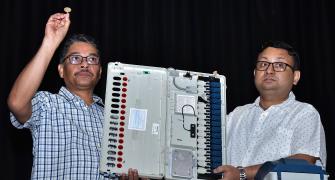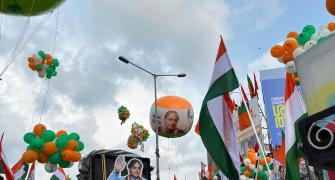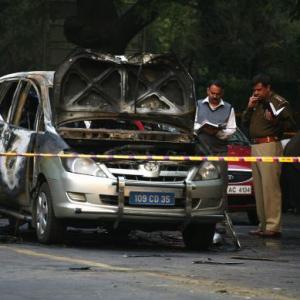Given the size of Indian cities, each of them would require a minimum of 1,500 CCTVs. They need to be set up in prime locations, says Vicky Nanjappa
Authorities once had an ambitious plan for New Delhi: 2,000 close circuit televisions at 90 entry and exit points, monitored by 150 control rooms.
The reality today is slightly different: Only 36 CCTVs in major locations being monitored by 28 control rooms.
Delhi has had more than its fair share of terror attacks. Since the time Commonwealth Games were held in the city, plans about installing CCTVs have been afoot.
Experts from across the world were roped in to chalk out a plan, which has remained on paper. When a blast shook the high court premises in Delhi in September 2011, the issue of lack of CCTVs came up again.
There is no proper footage of the bomber of the Delhi high court blast. In the latest case of a blast in an Israeli embassy car, the police don't even have a proper description of the bomber, but are still trying to prepare sketches.
The red bike that was used in this attack was captured by a random camera. The image is not clear enough for the police to figure out the number plate.
Delhi needs at least 2,000 CCTVs to monitor its vast expanse. Delhi has several entry and exit points and these areas are not surveyed by cameras or even the police control room.
After the recent attack, it was revealed that even so-called VIP areas in the national capital are not under the watch of CCTVs. The attackers, who had planned the terror strike meticulously, were obviously aware of this fact.
A CCTV is crucial for terror investigations as the police just cannot rely entirely on eye- witness accounts. Eye-witness accounts are often half-baked and several agencies across the world do not rely on them anymore.
Given the size of Indian cities, each of them would require a minimum of 1,500 CCTVs. They need to be set up in prime locations, crowded areas and the entry and exit points of a city.
Even though the government has a plan on paper, the actual implementation is yet to take place. The funding for such a large-scale exercise can be accrued from the funds collected by the traffic police while cracking down on offenders.
Earlier, the police used to get only 30 per cent of traffic offence fines and the rest would go to the government. After terror strikes became a relentless reality, authorities have let the police keep the sizeable amount of money collected from traffic offenders, to help fund the installation of CCTVs.
The government has left it to the police to act on the matter and there will be a review of the situation very soon. The police claim that they are encouraging shops, offices and other establishments to install CCTVs.
But the police need to take the issue seriously and install CCTV cameras across all major Indian cities. The project is likely to cost them nearly Rs 10 crore.
Even if private establishments install CCTVs, only the ones put in place by the police can be monitored 24/7.






